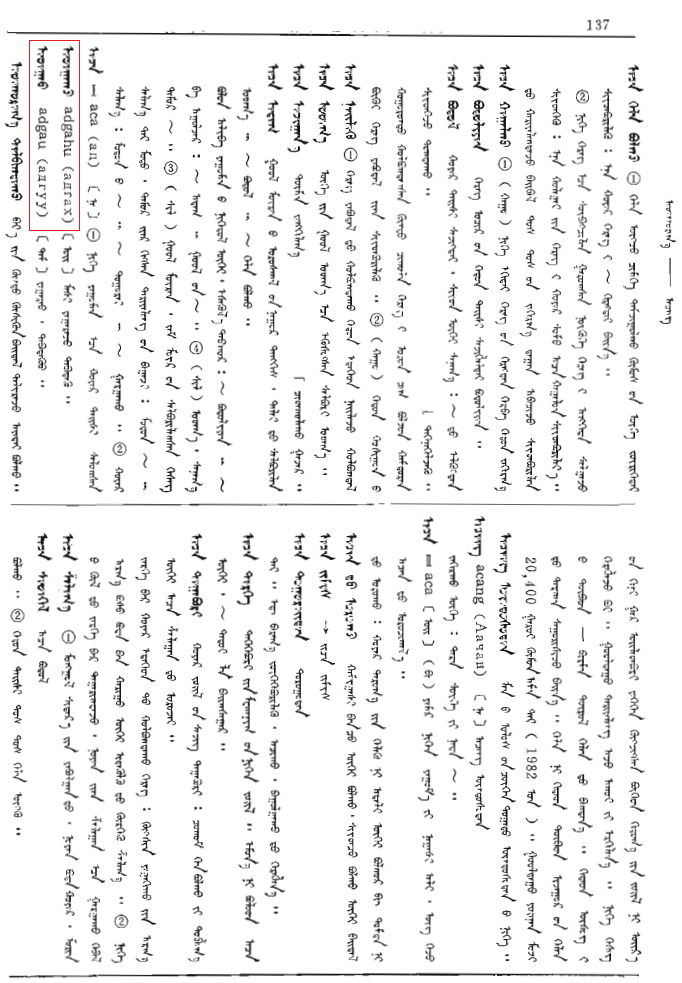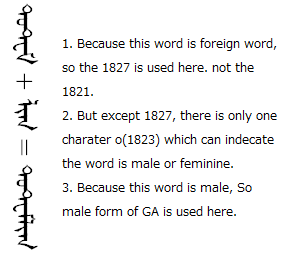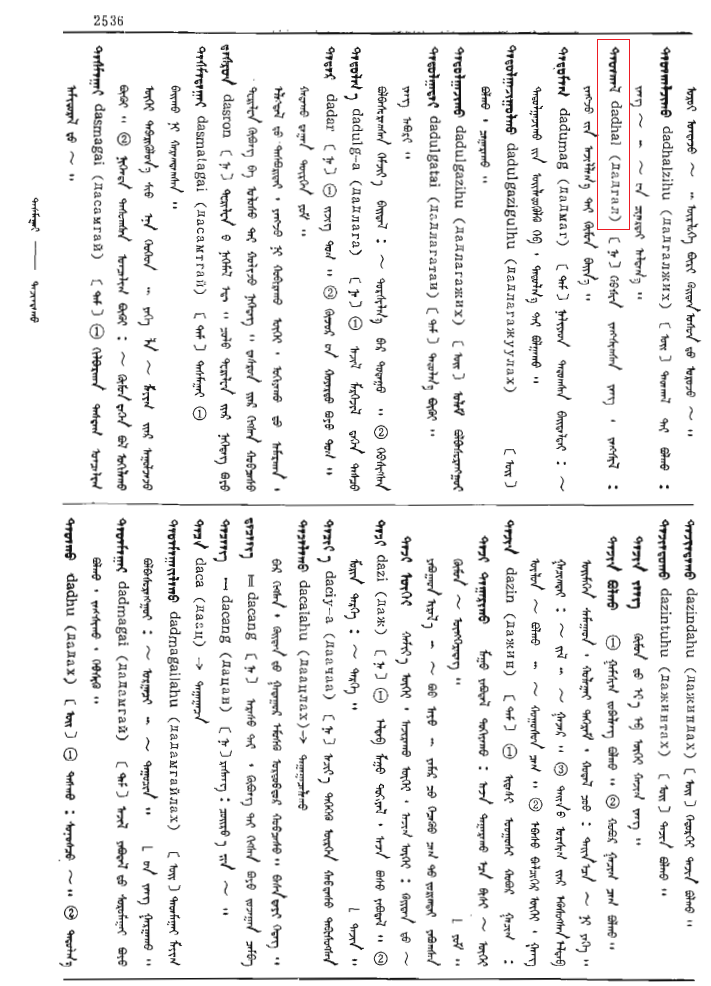- From: siqin <siqin@almas.co.jp>
- Date: Mon, 24 Aug 2015 12:28:43 +0900
- To: Greg Eck <greck@postone.net>, "public-i18n-mongolian@w3.org" <public-i18n-mongolian@w3.org>
- Message-ID: <55DA8F6B.9040809@almas.co.jp>
Hi Greg,
> ·182D Medial given the case where the contextual rules for the dual
> dots must be over-ridden. In other words, the context dictates that
> the medial GA is dotted, however, the actual shaping of the word is
> desired without the dots. I have not had the time to track down
> examples for this.
I did not face with this case in my font implementation experiment.
It may be :
There is a grammar rule which the two dots will be omitted if
g(182D) follows s(1830) and d(1833) in Traditional Mongolian.
( The most dictionaries spell it as QA and read it as GA. )
medi_ga_exception1.png
medi_ga_exception2.png
But there is a exception
medi_ga_exception3.png
So, if over-ridden is needed, the doted GA, not the undoted one. I
think.
> ·182D Final given the case where the feminine final GA does not
> follow the common pattern of sweeping to the left, but however sweeps
> to the right. In other words, the word is composed of feminine vowels,
> but carries a masculine right-ward swept tail. From discussions with
> Professor Quejngzhabu, I understand that there are just a small subset
> of words (5-6 in quantity) that follow this pattern.
See
final_ga_exception1.png
final_ga_exception2.png
final_ga_exception3.png (?)
SiqinBilige
On 2015/08/24 0:19, Greg Eck wrote:
>
> I am ready to wrap up the discussion on FVS Assignment Mismatch.
>
> However I am still lacking good examples on two of the over-rides
> discussed ...
>
> ·182D Medial given the case where the contextual rules for the dual
> dots must be over-ridden. In other words, the context dictates that
> the medial GA is dotted, however, the actual shaping of the word is
> desired without the dots. I have not had the time to track down
> examples for this.
>
> ·182D Final given the case where the feminine final GA does not
> follow the common pattern of sweeping to the left, but however sweeps
> to the right. In other words, the word is composed of feminine vowels,
> but carries a masculine right-ward swept tail. From discussions with
> Professor Quejngzhabu, I understand that there are just a small subset
> of words (5-6 in quantity) that follow this pattern.
>
> ·I am attaching two files showing data sets for the non-over-ride
> cases here.
>
> *Erdenechimeg, Siqin, I wonder if you or others can help find some
> good examples that we can state in this regard? Your examples before
> were so helpful. We have some good examples for the 1822 medial
> single-tooth over-ride with NAIMA (eight). Also, we have a good set
> with the 1828 undotted medial over-ride. But we are still lacking for
> the two cases of the 182D GA as listed above. Anything we can document
> here will be helpful.*
>
> Thanks,
> Greg
>
> PS Our next topic will be Isolates an exhaustive overview
>
> -----Original Message-----
> From: Greg Eck [mailto:greck@postone.net]
> Sent: Friday, August 14, 2015 6:14 PM
> To: Richard Wordingham <richard.wordingham@ntlworld.com>;
> public-i18n-mongolian@w3.org
> Subject: RE: Reference Scheme for Mongolian Rendering
>
> Hi Richard,
>
> Attached please find the rules for the four over-rides.
>
> I did this a bit fast, everyone please look over carefully to see if I
> made a mistake.
>
> Thanks,
>
> Greg
>
> -----Original Message-----
>
> From: Richard Wordingham [mailto:richard.wordingham@ntlworld.com]
>
> Sent: Friday, August 14, 2015 8:56 AM
>
> To: public-i18n-mongolian@w3.org <mailto:public-i18n-mongolian@w3.org>
>
> Subject: Reference Scheme for Mongolian Rendering
>
> Looking at Greg's list of data sets (DS...) in his post of Saturday
> 8th August ('Mongolian Variation Sequences Missing from Unicode 8.00
> Code Chart',
> http://lists.w3.org/Archives/Public/public-i18n-mongolian/2015JulSep/0248.html
>
> ), we are missing two important items:
>
> 1) A reference scheme for rendering. I offer one in the attachment
> rendering_framework.odt.
>
> 2) The rules for contextual forms that may be overridden by variation
> selectors. Without these rules, we do not know whether we have an
> adequate set of variation selectors for rendering connected text.
>
> I am trying to identify the contextual rules, though I am not the best
> person for the job. NNBSP has me worried. Do we need to identify
> suffix rules for every language that might conceivably be written in
> the Mongolian script with separated suffixes?
>
> Richard.
>
Attachments
- image/png attachment: medi_ga_exception3.png

- image/png attachment: final_ga_exception1.png

- image/png attachment: final_ga_exception2.png

- image/png attachment: final_ga_exception3.png

- image/png attachment: medi_ga_exception1.png

- image/png attachment: medi_ga_exception2.png

Received on Monday, 24 August 2015 03:29:14 UTC